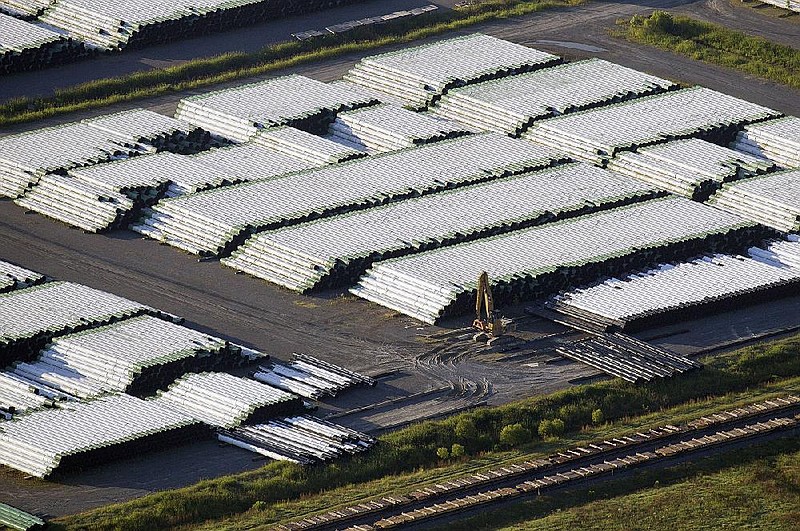Pipe supplier Welspun Tubular LLC is facing a fine from state environmental regulators because of excessive emissions of a hazardous air pollutant at its manufacturing facility located at the Port of Little Rock.
Under a consent administrative order signed last month between regulators and Welspun, the company will have to pay a civil penalty of $4,800, according to a spokesman for the Arkansas Department of Energy and Environment.
The funds from the civil penalty will go to Arkansas' Remedial Action Trust Fund, according to Energy and Environment Department spokesman Jacob Harper.
According to the consent administrative order, an investigation by state regulators showed Welspun exceeded the 12-month rolling emission limit of 9.5 tons per year of a hazardous air pollutant set by its operating permit. The facility exceeded the rolling emission limit for 10 months, from October 2018 through July 2019.
The hazardous pollutant released at the facility in violation of the permit was xylene, a compound frequently used as a solvent in industrial applications and as a paint thinner.
According to the federal Agency for Toxic Substances and Disease Registry, xylene can cause irritation to the eyes, throat, nose and skin, cause difficulty breathing and lead to impaired lung function -- among other negative health consequences -- when people are exposed to high levels of the chemical for a short period.
People are most likely to be exposed to xylene by breathing contaminated air, according to the agency.
The consent administrative order says Welspun contacted its paint manufacturer after the company realized the paint contained hazardous air pollutants. A new formulation of paint was developed for the facility containing a very small amount of formaldehyde, which is currently in use at the facility, according to the order.
Welspun did not admit or deny the factual and legal allegations contained in the order, according to the document.
A Welspun official, Rajesh Chokani, signed the order Aug. 13, as did Energy and Environment Department Secretary Becky Keogh on Aug. 25.
The payment is due Nov. 6, according to a spokesman for the Energy and Environment Department.
"At this time, no money has been received for the civil penalty," Harper wrote in an email Friday.
Welspun initially disclosed the emissions to the Arkansas Department of Environmental Quality (now the Division of Environmental Quality) in January 2019, according to documents obtained by the Arkansas Democrat-Gazette from the Energy and Environment Department.
A company environmental and safety manager, Wesley Crouch, wrote to the department to inform regulators that during an inspection in August 2018, the company had reported the paint being used on a coating line did not contain hazardous air pollutants.
Welspun believed that to be correct at the time but later found the paint did, in fact, contain hazardous air pollutants, Crouch wrote. The company began the process of acquiring a reformulated paint with a lower content of hazardous air pollutants, Crouch told regulators.
"Unfortunately, before the new formula was available as a replacement, we used enough of the HAP containing paint to cause an exceedance of the limit of 9.5 tons for an individual HAP" set by the facility's permit, Crouch wrote.
The environmental department conducted a full compliance inspection of the facility located at 9301 Frazier Pike in August 2019, according to the consent administrative order.
Three months later, a Welspun official wrote to the department to formally ask for penalty mitigation under the state's environmental self-disclosure incentive policy, records show.
The department declined. According to the consent administrative order, regulators informed Welspun in February 2020 that the company did not meet all eight conditions required to qualify for a reduction of the civil penalty.
Rusty Fisher, president of Welspun's Americas business unit, said the incident was self-disclosed to the environmental department. Fisher said the company cooperated with the department and made corrective actions as a result.
The excessive emissions stemmed from Welspun spraying a particular type of coating to the inside diameter of its pipes, Fisher explained.
"We made a mistake in our supply chain, and we ordered the wrong type of coating, or paint," Fisher said.
The mistake was corrected in their system to prevent the excessive emissions from happening again, he said, and the company substituted another type of coating "which eliminated this xylene."
Welspun, a subsidiary of an Indian company, recently announced that the company has received an order to produce approximately 190 miles of pipe for the Keystone XL pipeline, which will allow the company to avoid having to reduce the workforce at the Little Rock facility.
